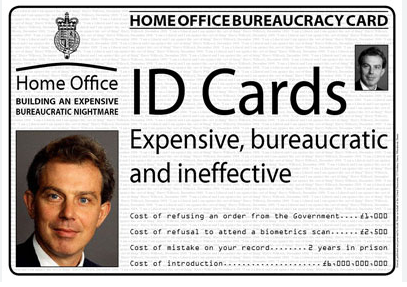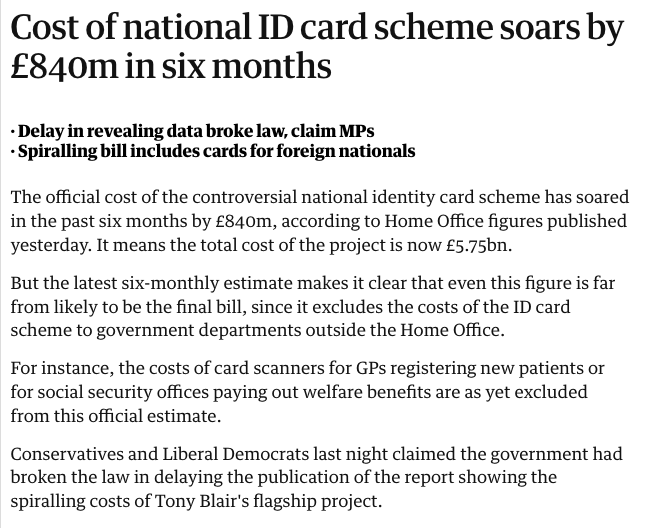We can be pretty certain that later this year there will be a change of government and that the Labour Party will regain power at the General Election. Quite apart from drawing parallels between the electoral outcomes of 1997 and now, we also need to be mindful of Labour’s policy DNA and what might happen in the coming years. What have they got up their sleeve they didn’t have time for in the 1997 – 2010 period?
The idea of ID cards is now fringe in terms of political debate, but occasionally I see data science nerds and the chief architects of ID cards, Tony Blair and David Blunkett, continue to advocate for them. Will this be part of the Labour manifesto? One of the first things the coalition government did was to axe the scheme, something I was incredibly pleased about. Let’s revisit the idea of ID cards and I’ll explain why I feel so strongly against them.
A return to authoritarianism
While many people quite rightly decry the populism of Johnson and Trump and the trampling over constitutional norms that they brought to both side of the Atlantic, Tony Blair brought a particular brand of strong arm authoritarianism that we haven’t seen before or since in the modern era. As a Liberal I found myself supporting the public sector investment and good economic management in the New Labour years but I had a major problem with the civil liberty constraints emerging, such as:
- Blanket CCTV coverage, the highest per person of any democracy
- Use of kettling to pin peaceful protestors for hours
- Introduction of high responsibility, low status ‘Little Hitler’ PSCOs
- Infiltration of peaceful protest groups by plain clothes police
- Badly worded Anti-Terror law used to arrest people for harmless activity in the public realm
- Continued deployment of notorious Police units such as the Territorial Support Group
ID cards were the next cab off the rank in terms of a control freak agenda. Time ran out on the idea, and for good reason, a national ID card scheme was set to cost much much more than all of the above combined.
Expensive and pointless – we can ill afford it
Supporters of ID cards jump through mental gymnastics to explain how having an ID card is really really important in addition to having a driving licence or a passport. If you’re actually keen on an Orwellian police state you could argue that identity cards are an idea that’s been and gone – they’re no longer needed. With so many cameras everywhere, including ones in your phone, and GPS tracking in smart phones, the digital world means you leave a footprint everywhere you go, voicemails, phone calls, emails can be tapped or hacked, the only thing that’s really private these days are your private thoughts.
Those in favour of ID cards also back them no matter the cost. When the idea was first floated in the early 2000s the initial estimate was £4Bn, by 2007 that had gone up to £5.75Bn. This is typical of mega projects, where to justify their existence costs are always underestimated and benefits overstated.
What would be the estimated cost today? Around £10Bn perhaps, but the real cost, because large IT projects always overrun, closer to a £13 – 15Bn range. When the estimate for the ID card scheme went up, even New Labour loyalists started to question the logic, the government had been burnt by the NHS patient records IT fiasco that ballooned out to £12.7Bn (original estimate £6.4Bn). New Labour had put misplaced faith and trust in technology, and didn’t seem to be learning any lessons (it was keeping problems with the Post Office’s Horizon software under wraps at this point, though problems were known about it dating back to 1998).
The problem with IT projects is that despite the fact that technology improves, delivering a new bespoke IT system is incredibly difficult and it never gets any easier. I have friends that code for a living, they tell me that if one semi-colon in thousands of lines of code is out of place, the program will not work. It’s small wonder than many early versions of well-known software are full of bugs. Double checking, triple checking code until it’s impeccably clean is a very time-consuming and difficult task, so getting excellent IT systems in place for something that’s straightforward as issuing a separate photo ID card will cost you. Creating a national ID card scheme will never be cheap or quick. If today’s Labour adopts such a scheme, alarm bells should start ringing – it shows it’s learnt nothing from the worst public policy and spending mistakes from its previous time in government.



The idea of ID cards was put to bed in 2010, will we see a return with the next Labour Government? Keir Starmer is yet to make his position clear
Changing the relationship between the individual and the state
I’ve always noticed that those who advocate for ID cards are exclusively white British males living in Britain who in pretty much every respect are in the cultural mainstream, nothing would mark them out as being part of any social group on the fringe of society. Such people would not feel threatened being approached by a Police Officer or would never have to talk to other arms of the state, such as a housing officer, to avail themselves of certain public services. They have no consideration for ethnic minorities, travellers, sex workers, religious minorities, people with special needs, the LGBTQI community – anyone that has a problematic relationship with the rest of society or with the police specifically.
In 1992 I took a politics exam at university, one of the questions was ‘Are the police institutionally sexist, racist and homophobic?’ An intellectual debating point more than 30 years ago, in the intervening time what’s changed and improved? We’re still looking for a root-and-branch reform of dysfunctional forces like the Met today.
The fact so much time has elapsed and so little has improved suggests it will take a huge amount of resource to improve the police force and weed out the bad apples that would abuse the existence of ID cards. Will the next government have that appetite? Past performance suggests otherwise.
There are long-running debates about the merits or the legality of suspicionless stop and search of pedestrians minding their own business, or the flagging down of cars by that are driving normally by traffic cops. Opponents of suspicionless stop and search describe it as a sledgehammer trying to crack a nut, it creates sufficient ill will to be counterproductive as a law enforcement tool. Issuing a national ID card, then placing the onus on all individuals to present an ID card to the police at all times feels like stop and search on steroids.

From a philosophical point of view it fundamentally changes the relationship between the individual and the state in a free society – that is at present our expectation is that we’re left alone as law abiding citizens by the police and do not have to jump through hoops when we interact with the law.
This particular relationship was of great concern to Orson Welles who spoke often about it, this particular clip encapsulates his thoughts really well:
Towards the end of this clip he talks of a potential ID card, but one issued on your terms, not the state’s and he says, “I see that card fitting into a passport, with a border around it in bright colours, so that it would catch the eye of the Police. The card itself should look like a Union Card, or the card of an Automobile Club and since it’s purpose is to impress and control officialdom, well obviously it should be official looking as possible, with a lot of seals and things like that on it. And it might read something as follows, ‘This is to certify that the bearer is a member of the human race, all relevant information is to be found in his passport. And except where there is good reason of suspecting him (or her) of some crime, he will refuse to submit to police interrogation on the grounds that any such interrogation is an intolerable nuisance, and life being as short as it is, a waste of time.
Any assault, however petty, against his dignity as a human being, will be rigorously prosecuted by the undersigned – ISPIAO – and that would be the International Association for the Protection of the Individual Against Officialdom.’”
Welles’ statement is a thorough and belligerent response to the notion of increasing powers being given over to the police set in the context of interwar fascism, communism across Europe (he regularly travelled to Britain, Ireland and the continent during that time) and the horrors of World War II.
This led to a brief flowering where the concept of civil liberties and human rights was extremely popular in the post-war period. Anglo-Saxon societies were hypersensitive to the notion of overbearing offices of the state, we’d fought, died or risked our lives to ensure freedom after all.
All Liberals should want a balance in the relationship between the state and the individual whereby the individual is left free to live their life as they see fit so long as they aren’t harming others and breaking laws. As far as I’m concerned that is a life where you don’t carry an ID card around with you every time you leave the house in anticipation of a ‘Where are your papers?’ moment when stopped by the police.